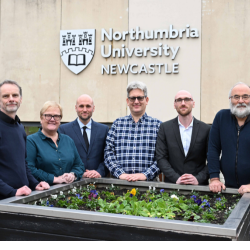Education
Education is one of the essential building blocks of society and is a fundamental right of everyone. In our knowledge-based economy, the continuing development of high-quality education settings, staffed by enthusiastic and highly qualified individuals is vital, confirming that education is a lifelong process. Working as an educator is both a rewarding and complex business. The quality of your work can, and does, have a lasting impact upon individuals, whether they are the youngest member of our society or at a later stage in their academic career. We aim to create excellent educators. Study with us on any of our programmes described online and join us on a journey of exploration.
Programmes:
Childhood and Early Years
Our work around childhood and children’s Early Years deals is concerned with a wide range of topics at individual, family, organisational and societal levels. We look at children’s experiences in context and seek to understand. How children, young people and families’ experience families, institutions, services and cultural phenomena. How services for children and their families can be more inclusive and create better outcomes. How and why children, young people and their carers (especially from marginalised groups) are represented as they are in societies. In understanding these things, we ask questions about topics such as gender, inequality, power, culture, politics and the implementation of social policy. Our work in this area therefore aims to be critical and reflective and sets out to equip people to both understand issues and act on them. Practically, we are very interested in supporting children and equipping professionals who work with them.
Programmes:
BA (HONS) CHILDHOOD AND EARLY YEARS STUDIES
Public Health and Community Wellbeing
Our work in Public Health and Community Wellbeing focuses on the development of research and practice that enhances the wellbeing of individuals and their wider communities, underpinned by values of social justice and inclusion. We offer a broad range of programmes which open up a range of exciting career options working with individuals and communities. Our innovative approach offers valuable opportunities to prepare to enter the integrated health and social care sector, and further postgraduate learning for established professionals wishing to advance their knowledge and practice. We also engage in pioneering research in partnership with communities, practitioners and organisations to develop new knowledge and understanding of contemporary issues in the sector. With a strong interdisciplinary focus, we collaborate across many subject areas in the department, faculty and beyond. We work closely with a wide range of local organisations and value our engagement with key stakeholders, including services, practitioners and the general public
Programmes:
Social Work
Social work is professional discipline centred around people and communities. It makes a distinctive contribution to promoting and securing the wellbeing of children, adults and families. Social work is concerned with the personal, practical, psychological and social aspects of people’s lives and it makes a particular contribution in situations where there are high levels of complexity and conflicts of interest. In practice social work takes place in a variety of organisations: local authorities, NHS Trusts, the voluntary and private sector, social enterprises and higher education institutions. Our social work team focus on the development of research and practice that enhances the wellbeing of individuals and their wider communities, underpinned by values of human rights, social justice and inclusion. Social work is an interrelated system of values, theory and practice. It seeks to make a difference by working with people directly to understand their lived experiences and help them to develop their full potential. Social work practitioners and academics act as agents of change, collaborating to empower individuals, families and communities. Northumbria University has more than 25 years of experience in running successful qualifying and post-qualifying social work programmes. We are an experienced and enthusiastic teaching team, many of whom are registered social workers, with a wide variety of research and subject expertise. We engage in pioneering research in partnership with communities, practitioners and organisations to develop new knowledge and understanding of contemporary issues in the sector. With a strong interdisciplinary focus, we collaborate across subject areas in the department, faculty and beyond. We have an extensive network with local organisations and value our engagement with a range of stakeholders.
Programmes:
Occupational Therapy
Occupational therapy works to promote health and well-being through occupation, enabling people to participate in the important activities of everyday life. Occupational therapists work with people and communities of all ages, in a variety of settings, providing practical support with a wide range of issues that might occur after illness, disability or a major life event. ‘Occupations’ can be any everyday task that has meaning to the individual – anything they want to, need to, or are expected to do. This might include things like self-care, leisure, work or community participation. Think about your own daily life; what are the things you do which give life meaning and purpose? Imagine you were unable to do something that matters to you – dress yourself, use your phone, drive a car. How might it affect how you feel about yourself and how you conduct your daily life?
Occupational therapy is varied, creative and person-centred. Each person is different, and the work of the occupational therapist is unique to the clients’ particular experiences, needs and goals. We work together to identify what the individual wants to do, understanding the opportunities and barriers in their lives, and using creativity and problem solving to identify practical solutions. We work to build the persons’ skills and capacity; we also look at how everyday tasks can be modified to make them easier to do and we adapt the environment to help support the individual’s participation.
Meet Hanna: Hanna is 32 and has been diagnosed with Multiple Sclerosis. She is experiencing problems with balance, co-ordination and fatigue. Hanna has two young children and works part-time and is worried about managing her roles. We could help Hanna plan her daily activities to conserve energy and prioritise her tasks so that she focuses on her most meaningful occupations.
Meet Pete: Pete is 72 and has experienced depression since he retired. We would work with Pete to identify what he enjoys, what he is good at and what he misses about work. We could explore ways to enhance his mood and identify occupations or activities that could be adapted to his age, ability, and interests. For example, if he liked playing and watching football, we could support him to join a ‘walking football’ club.
When people can participate more fully in meaningful occupations they gain a greater sense of purpose, meaning and satisfaction in all aspects of their lives. Undertaking occupational therapy at Northumbria University can promote health and help people to flourish, contribute to their own well-being and realise their potential.
Programmes:
Guidance and Counselling
This Programme provides a valuable foundation for those who wish to use guidance and counselling strategies as part of a job role within a range of ‘helping’ professions or as basis for further research or professional training. This theoretically rich subject draws upon a range of disciplines including Psychology, Sociology and Philosophy. You will be encouraged to develop critical thinking, to be able to recognise the inequalities and discriminatory practices encountered by people in everyday life and to consider strategies to influence and bring about change.
You will engage with a range of learning experiences that include group work, case studies, enquiry based and experiential learning, as well as the more traditional lecture-based approach. Applying theory to practice is a central theme of the course and you will take part in a number of experiences to enable you to develop your skills such as peer mentoring, careers interviews and group facilitation. Work placements and study abroad options are available for a full year between your second and final years, with the additional option of a placement module during your second year.
BA Hons Guidance and Counselling at Northumbria is unique in being the only undergraduate programme that qualifies you to enter the career guidance profession, just one of the areas graduates can go into. Our graduates offer a unique skillset which equips them for a wide range of job roles within education, health and community settings, many which support mental health and well-being, an area where there is growing demand. Students can also use their degree as a basis for further study or professional training in areas such as Counselling or Social Work (please note that in order to qualify as a Counsellor you would need an additional qualification and observed experience in practice – something many students choose to do).
Programmes:
BA (HONS) GUIDANCE AND COUNSELLING
Health and Social Care
Health and Social Care is a central feature of modern societies, and this degree will support you to review and evaluate different health and social care systems. You will research the history of health and social welfare provision, critically examine a range of professional roles, analyse global health questions and government policy, as well as debate a range of significant social care developments such as disability, equality and social justice; migration and asylum; health and the life-course and the integration of health and social care services. This knowledge prepares you for potential roles in a variety of health and social care settings, in the public, private and voluntary sectors, as well as for further, post graduate and professional study. There are opportunities to gain work-based experience, and a strong focus on employability within modules which will support you to develop ‘real-world’ understanding of the subject and strengthen your career profile. The Health and Social Care degree has evolved from well-established and stimulating programmes delivered by an experienced team of research active academics who come from diverse professional and health and social care backgrounds. Several staff have previously worked in public, voluntary and private organisations in health and social care. You will therefore benefit from leading-edge teaching and research alongside tutors who are able to support you in making links with ‘real world’ practice in a range of settings. Members of our team regularly engage in research relating to your teaching and learning experience on the programme to ensure that your experience of studying Health and Social Care is based on the most up to date developments in the field.
Programmes:
BSC (HONS) HEALTH AND SOCIAL CARE









